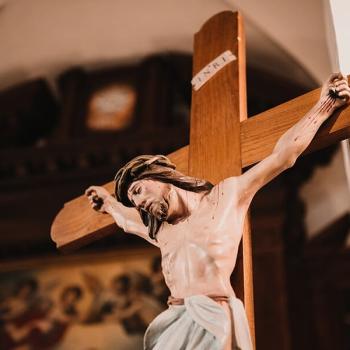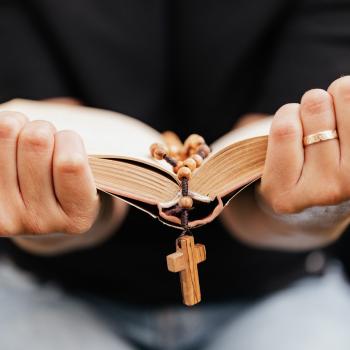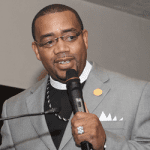Lectionary Reflections on Mark 1:29-39
Epipany 5: Sunday, February 5, 2012
There is an old and not terribly funny joke about a sea captain who was at the top of his profession. He had earned a reputation as one who could make excellent decisions in times of crisis. People did notice, though, that just before it was time to give his orders to the crew, he would go down to his stateroom, open his safe, and pull out a slip of paper and read it. Then he would stride on deck and make the right call. Naturally, curiosity was high. It was no surprise, that, when he died, one of the first things the crew did after his funeral service, was to gather in his stateroom and watch while the first mate opened the safe and pulled out the well worn slip of paper. He read it aloud:
Port left, Starboard right.
In difficult times, the captain knew to remind himself repeatedly of the basics.
The captain’s little slip of paper held information that everyone already knows.
But it was his secret, the basic source of his ability to act.
In Mark’s Gospel, Jesus is a little like that Captain. He has a secret. It is often called “The Messianic Secret” and it is especially pronounced in Mark.
He is secretive about his identity. Jesus refrains from appropriating any Messianic title for himself (8:29031; 14:60-62; 15:2-5).
He chooses an enigmatic teaching genre. He teaches in parables in which the secret of the kingdom of God lies hidden. (4:11; 33)
He repeatedly “sternly orders” people not to tell his secret. “Shhhh,” is Jesus’ message to demons he exorcizes (Mark 1:25, 34; 3:11f). “Shhhh,” is his word to a leper healed (1:44), a synagogue leader whose daughter he restores to life (5:43), a deaf man he restores to speech (7:36), and a blind man at Bethsaida he restores to sight (8:26).
“Shhhh,” Jesus orders Peter after his confession “You are the Messiah” in 8:30.
“Shhhh,” Jesus commands Peter, James and John as they descend the Mount of Transfiguration.
William Wrede in 1901 proposed that the “Messianic Secret” was Mark’s face-saving creation, a way to explain why Jesus was not recognized as the Messiah until after his resurrection.
Other scholars have contested Wrede’s theory on the ground that it may well be that the “Messianic Secret” permeated the traditions on which Mark drew. Still others point out that the Messianic Secret is not a damage control strategy Mark made up.
For Mark it functions throughout his gospel like the little slip of paper in the captain’s safe. It expresses the heart of Jesus’ divine identity.
The healings and exorcisms reveal the effects of Jesus identity and divine power, but the good news is not reducible to them. Jesus’ immediate withdrawal in verse 35 early in the morning while was still very dark to a deserted place to pray emphasizes that the power and authority of his exorcisms and healings came from God.
Says New Testament scholar Hugh Anderson: “Such externals might satisfy the popular craving for the spectacular, but they do not ever constitute the good news. For Mark the good news begins with Jesus and what is decisive about Jesus is his suffering and death and call to follow him” (Anderson, 93)
Jesus’ repeated stern injunctions to people “not to tell” are not completely successful. The demon knows him in 1:24-28. The healed leper spreads the news (1:45) and a whole crowds observes the healing of the paralytic let down through the roof by his friends (2:12). In the Transfiguration, the disciples are witness to his supernatural glory (9:2-8).
Is the Messianic secret really a secret? No, and yes. It is and remains a secret to those who define power and authority in conventional ways. Those who seek conventional power and authority seek far different advice for living. It is available in countless books, blogs and seminars offering “secrets for success. “
Jesus’ authority and power come from his willingness to submit himself to God in sacrificial love for us. We are called to do the same for one another.
Those who would be disciples of the enigmatic Messiah of Mark’s gospel keep a slip of paper in a safe place on which is written the real secret of the kingdom of God in Mark: Divine power only flows through a cruciform life.
In a culture and a time that holds an opposite understanding of the source and purpose of power, we continually need this reminder.
As Christians, we all know at an intellectual level the secret of the kingdom of God: divine power only comes from a cruciform life. We know it the same way we know our left from our right. But the whole person has to get involved, not just the intellect and the lip service, when it comes to moving in one direction or another.
An old drunkard gentleman (drunkards are a group related to the Church of the Brethren) was once walking down the street in a little Pennsylvania town. A young evangelist approached him and handed him a tract, and asked him “Sir, have you been saved?” The old gentleman took the tract, peered at it a moment, then pulled a pencil out of his pocket and began writing on the tract. The younger man stood by impatient and curious. Finally the old man handed him back his tract.
“I’ve written down the names and phone numbers of several of my family and friends. Ask them if I’ve been saved. I could tell you anything.”
If we are living faithful lives, seeking to serve others and love them as Christ loved us, it’s no secret to anyone.
















